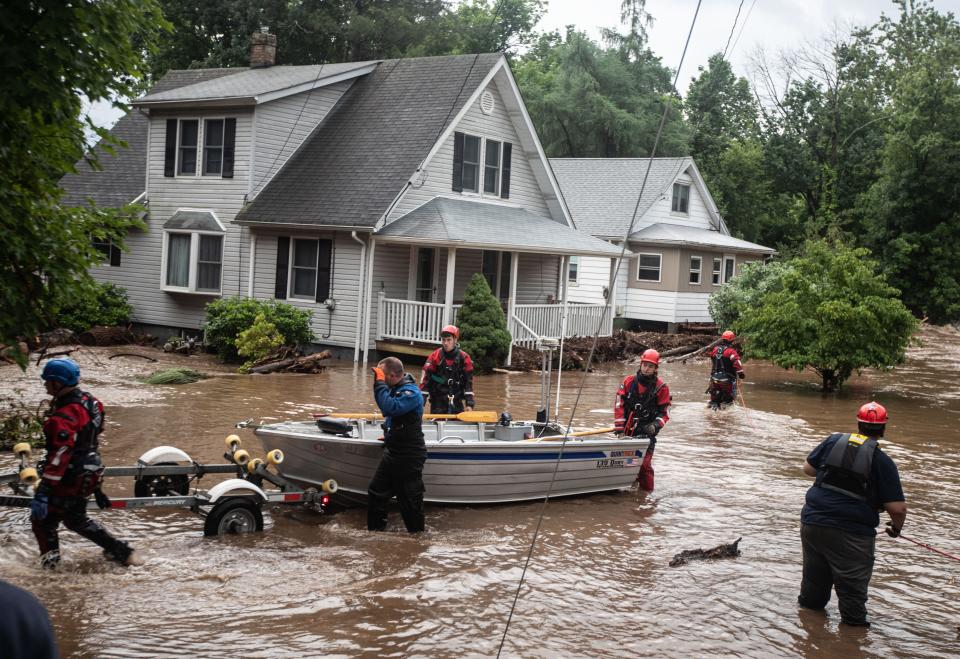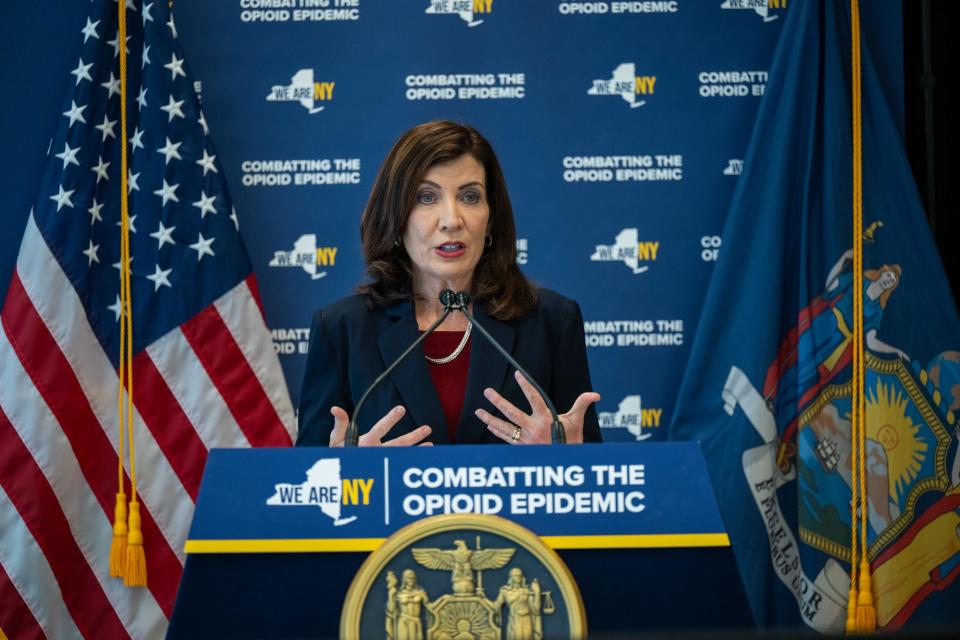Kathy Hochul must compel big oil to fund NY's work to the address climate crisis
- Oops!Something went wrong.Please try again later.
World leaders, climate activists and scientists have converged on Dubai for the U.N.’s 28th Climate Change Conference, COP28. The Dubai conference comes as we experience the planet’s ongoing and escalating climate catastrophe. While world leaders have committed to limiting global temperature rise to 1.5 degrees Celsius — 2.7 degrees Fahrenheit — above those of a century ago, the evidence of a worsening situation is mounting.
Sadly, despite promises for action, the world’s climate is unraveling. After 28 U.N. climate conferences, we can expect a lot of talk but little meaningful action.
The United States, the historic leader in greenhouse gas emissions, must take center stage as the driver toward action. Yet here in the U.S. Congress is gridlocked, having been able to do little more provide the federal government short term funding; it seems unlikely to take the mounting climate crisis seriously. With little leadership from Washington, it’s up to the states to show the nation — and the world — how to tackle the climate crisis.
What challenges does New York face?
New York State has advanced new laws to establish a blueprint for moving to a green economy and new, more climate friendly measures to shift away from reliance on fossil fuels. Yet, the fossil fuel industry and its allies are pushing back and focusing public attention on the costs of action (although they say nothing about the catastrophic costs of inaction).

The Empire State already faces huge environmental problems due to climate change. Extreme weather events cost the state billions of dollars and the human toll is incalculable. Last winter’s historic blizzard in Buffalo resulted in dozens of deaths and millions in costs. Massive flooding throughout upstate New York over the summer caused one death and destroyed homes and damaged roadways. It cost tens of millions of dollars in damages.
These costs are not unique. Municipalities across the state are spending a staggering amount in climate related costs. A study from New York State Comptroller DiNapoli found that over a 10-year period (the last five and next five years), 55% of New York localities' municipal spending outside of New York City was or will be related to climate change.
It is expected that 2023 will be the hottest year ever recorded in human history. This past fall — after the summer’s upstate flooding — biblical rains devastated the tri-state area. Flooding in Connecticut, New Jersey, and New York were fresh evidence that the costs of adapting infrastructure to the world climate’s "new abnormal" will be staggering.
As if the record flooding weren’t bad enough, devastating Canadian wildfires poisoned the air and risked the health of New Yorkers across the state last summer.
How should Gov. Kathy Hochul respond?
What should Gov. Kathy Hochul do? She has already unveiled some $2.7 billion in state money to be spent on climate related projects — either responding to disasters or spending to help protect from future ones. For as much as that is, it pales in comparison to expected climate costs. Climate costs could top $55 billion by the end of this decade, according to a report from Rebuild By Design.

The governor’s budget plan for New York is currently being developed. Given the staggering and growing climate costs paid by taxpayers now and the ballooning costs in the years to come, one question should be clearly put to the governor: Will she continue to make New Yorkers pay for climate damages, or will she make those responsible — namely the biggest oil companies — pick up their fair share? Unless she acts, you will pay for climate costs, and you will pay for every penny of it.
Instead, the governor should make Big Oil pay: They have known for decades that burning fossil fuels heats the planet. Nevertheless, starting in the 1980s, the industry championed an aggressive climate change denial campaign opposing any policy proposals and undermining climate science. Their success in bamboozling many Americans has pushed the planet to the brink, while making themselves fabulously profitable. It’s one thing to turn a profit. It’s quite another to simply ignore the costs and let everyone else pick up the tab for the damage. It’s time for them to pony up — big time.
Hochul and the Assembly should embrace the state Senate's legislation to make the oil companies —not taxpayers — pay for the problems they have caused and do it in a manner that will stop them from passing the costs on to consumers.
It’s bad enough that New Yorkers continue to face increased flooding, poisoned air from wildfires and extreme heat. Taxpayers shouldn’t also bear the financial costs of cleaning it up. The oil companies who created the crisis in the first place should. Unless Hochul embraces the legislation that makes those responsible pay their fair share, she will have made the decision that taxpayers across the state will pay. Let’s hope she will follow the rule we all learned as children: “you made the mess; you clean it up.” New York should make the polluters pay.
Blair Horner is executive director of the New York Public Interest Research Group.
This article originally appeared on NorthJersey.com: NY climate change: Big Oil must be compelled to fund climate response

